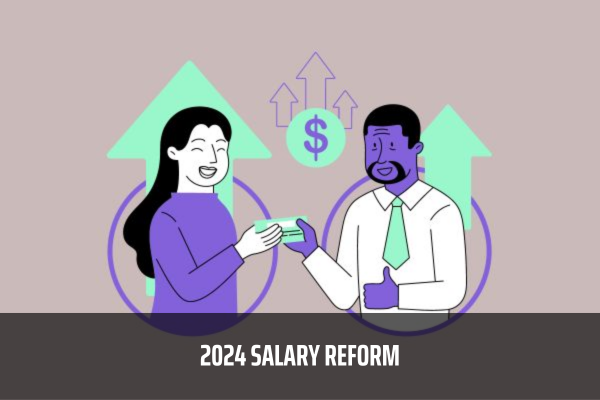What are the key highlights of the 2024 salary reform that benefit Vietnamese officials and public employees according to Resolution 27-NQ/TW?
What are the 3 key highlights of the 2024 salary reform that benefit Vietnamese officials and public employees according to Resolution 27-NQ/TW?
Pursuant to point a, subsection 15 of Section I of Resolution 144/NQ-CP in 2023, the responsibilities of the Ministry of Home Affairs of Vietnam regarding salary reform are mentioned as follows:
Regarding the economic-social situation in August and the first 8 months of 2023
...
15. The Ministry of Home Affairs shall lead and coordinate with relevant agencies and local authorities:
a) Take the lead in coordinating with relevant agencies to incorporate the opinions of the Party Central Committee in order to finalize the draft report to be submitted to the National Assembly on the roadmap and plan for salary policy reform, and submit the report to the Government and the Prime Minister before September 16, 2023.
Thus, September 16th was the deadline for the Ministry of Home Affairs to complete the salary reform plan and submit it to the Government.
Following the guidance of Prime Minister Pham Minh Chinh, the Ministry of Home Affairs urgently finalized the salary reform plan.
Previously, in 2018, the Central Executive Committee issued Resolution 27-NQ/TW in 2018 on salary policy reform for officials, public employees, armed forces, and workers in enterprises.
The reform is carried out in a comprehensive manner, from the salaries of officials, public employees, and armed forces to the salaries of employees in businesses and workers. The goal is to build a salary policy that is coordinated and harmonious between the public and private sectors.
Salary reform also aims to rearrange the salary structure along with additional allowances.
Accordingly, there are three notable points in salary reform that benefit officials and public employees according to Resolution 27-NQ/TW in 2018, as follows:
Firstly, the salary of officials, public employees, and armed forces (in the public sector) will be designed to include:
- Base pay (accounting for about 70% of the total salary fund) and additional allowances (accounting for about 30% of the total salary fund).
- Bonuses (the bonus fund is about 10% of the total salary fund for the year, excluding allowances).
Secondly, a new payroll system will be developed based on job positions and leadership positions to replace the current payroll system; the transition from old salaries to new salaries will be ensured, guaranteeing that the new salaries are not lower than the current ones.
Thirdly, the role of the leaders of agencies, organizations, and units in the use of the salary fund is determined. Accordingly, the leaders are allowed to use an annual regular expenditure budget to hire experts, scientists, and individuals with special talents to fulfill the tasks of the agencies, organizations, and units, and decide the corresponding income payment level for the assigned tasks.
Regarding salaries in the private sector, the regional-based minimum wages will continue to increase, ensuring that the wages meet the minimum living standards. Ensuring the principle of distribution according to labor and the objective laws of the market economy, and maintaining correlation with salaries in the public sector

What are the key highlights of the 2024 salary reform that benefit Vietnamese officials and public employees according to Resolution 27-NQ/TW?
What are objectives of salary reform for Vietnamese officials and public employees?
Pursuant to subsection 2 of Section II of Resolution 27-NQ/TW in 2018, the objectives of salary reform for officials and public employees are stated as follows:
General objectives:
Build a scientific and transparent national salary policy system that is in line with the country's practical situation, meets the development requirements of the socialist-oriented market economy and proactive international integration, establishes harmonious, stable and progressive labor relations, stimulates production capacity, improves labor productivity, and enhances the quality of human resources. Contribute to building a clean, streamlined, effective, and efficient political system, prevent corruption and waste, ensure the livelihoods of salary recipients and their families, and promote social progress and justice.
Specific objectives:
- From 2018 to 2020
+For the public sector:
++ Continue to adjust and increase the statutory pay rate according to the Resolution of the National Assembly, ensuring it is not lower than the consumer price index and in line with the economic growth rate; do not introduce new allowances based on occupations.
++ Complete the construction and issuance of a new salary regime based on the content of salary policy reform, linked to the administrative reform roadmap and the streamlining of the organizational apparatus of the political system; innovate and reorganize public career units according to the Resolution of the Central Committee.
+For the business sector:
++ Implement adjustments and increases in region-based minimum wages that are appropriate to the socio-economic development situation and the payment capacity of enterprises, so that by 2020, the minimum wages ensure the minimum living standards of workers and their families.
++ Implement pilot management of labor and salary in state-owned enterprises according to the approved content of the salary policy reform project.
- From 2021 to 2025 and the vision to 2030
+ For the public sector:
++ From 2021, apply a unified new salary regime for officials, public employees, and armed forces throughout the entire political system.
++ In 2021, the minimum salary for officials and public employees will be equal to the average region-based minimum wage of the business sector.
++ Periodically adjust the salary level in accordance with the consumer price index, economic growth rate, and the state budget's capacity.
++ By 2025, the minimum salary for officials and public employees will be higher than the average region-based minimum wage of the business sector.
++ By 2030, the minimum salary for officials and public employees will be equal to or higher than the highest region-based minimum wage of the business sector.
+ For the business sector:
++ From 2021, the state will periodically adjust the region-based minimum wages based on the recommendations of the National Wage Council. Enterprises will implement salary policies through negotiations and agreements between employers and employees and their representatives; the state will not directly intervene in the salary policies of enterprises.
++ Implement labor and salary management in state-owned enterprises through task-based contracting linked to the production and business tasks of enterprises until 2025 and move towards task-based contracting for production and business tasks of enterprises by 2030.
What is the current statutory pay rate in Vietnam?
Pursuant to the provisions of Article 3 of Decree 24/2023/ND-CP,
Statutory pay rate
1. The statutory pay rate shall be used as the basis for:
a) Determining the levels of salaries in payrolls, allowances and other benefits as per the law with regard to individuals as defined in Article 2 of this Decree;
b) Determining the levels of subsistence allowances as per the law;
c) Determining contributions and benefits concerning the statutory pay rate.
2. From July 01, 2023, the statutory pay rate is VND 1.800.000 per month.
Therefore, in 2023, there will be 02 statutory pay rates applied as follows:
- From January 1, 2023, to June 30, 2023: The statutory pay rate is 1,490,000 VND per month.
- From July 1, 2023, onwards: The statutory pay rate is 1,800,000 VND per month.
Currently, the statutory pay rate used as a basis for calculating salary levels in payrolls, allowances, and other benefits as prescribed by law is 1,800,000 VND per month.
LawNet
